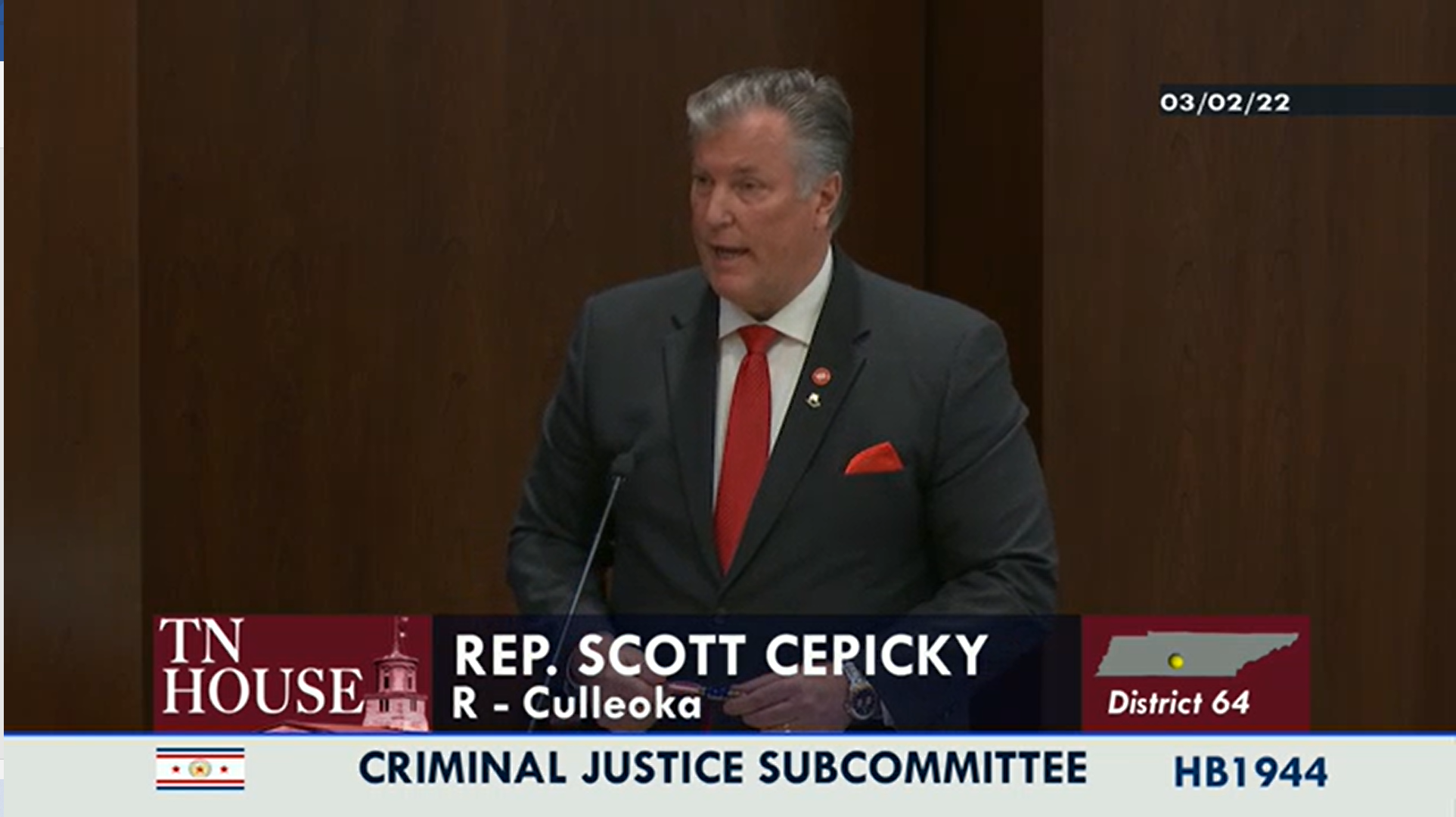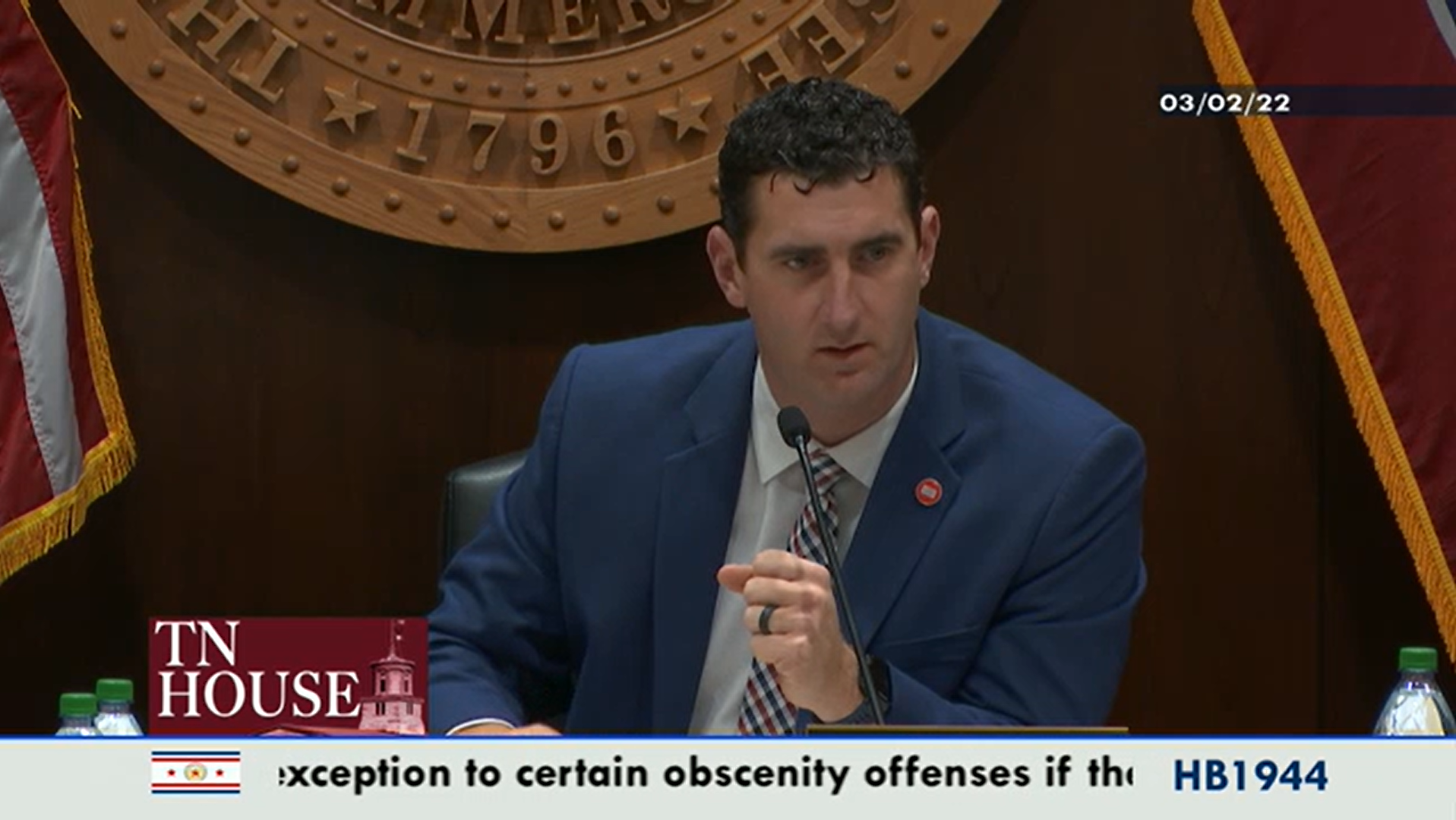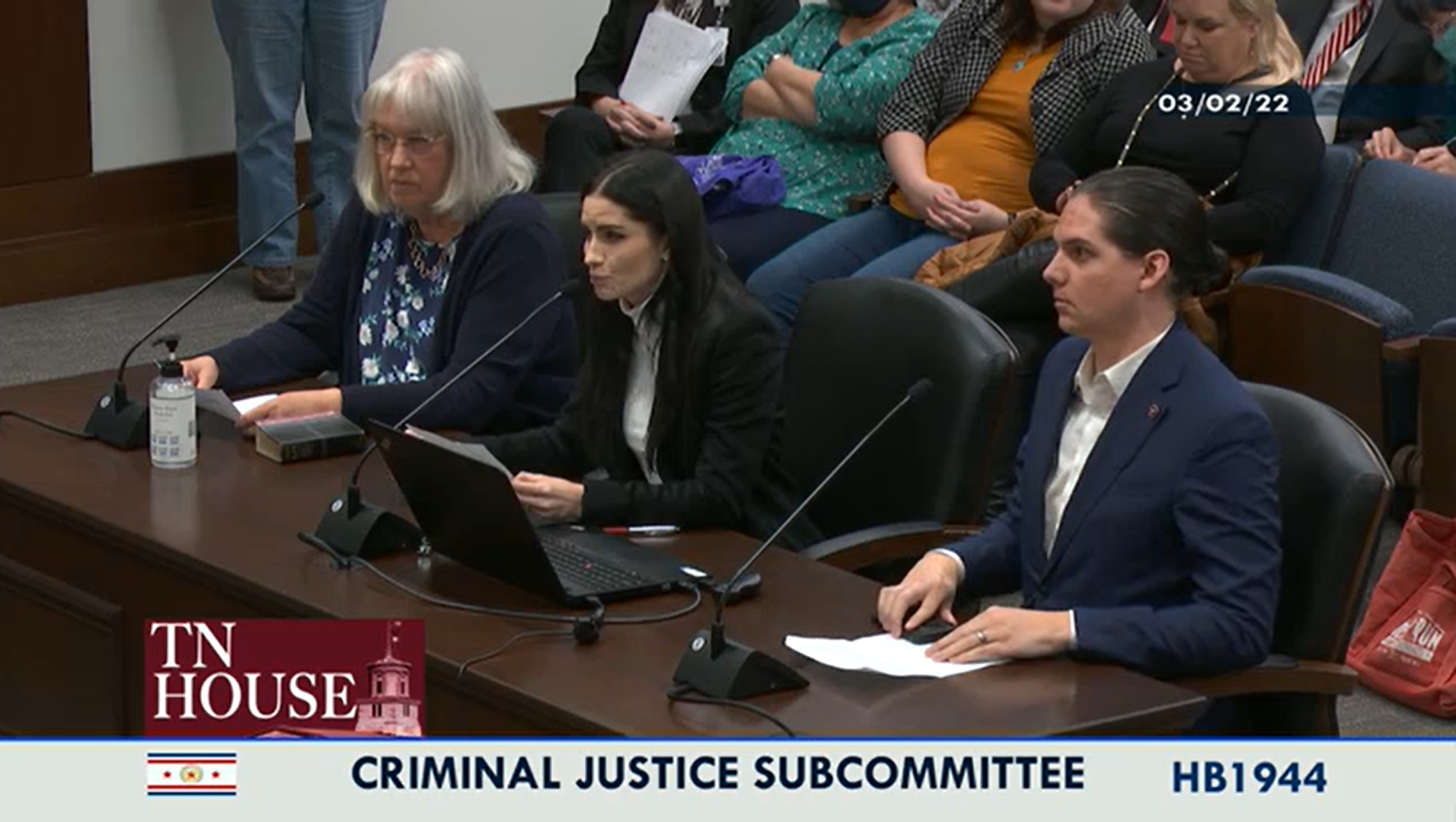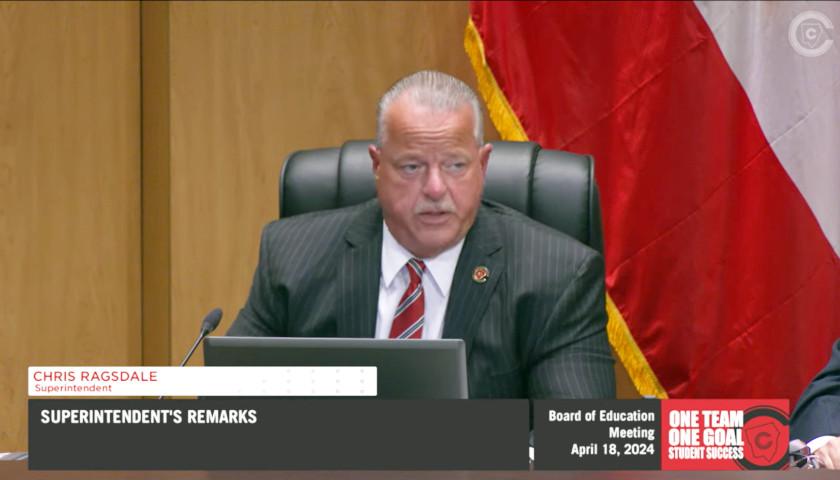At the end of meetings of the Tennessee House Criminal Justice Subcommittee held over two consecutive weeks where impassioned testimony was heard from nearly two dozen witnesses on both sides of the argument, a bill that seeks to protect students from pornographic and obscene materials in K-12 schools advanced Wednesday to the full House Criminal Justice Committee.
More than two hours of testimony was heard Wednesday from 15 members of the public, in addition to nearly an hour and three witnesses who testified last week including country music star John Rich, The Tennessee Star reported.
 According to the bill sponsor, State Rep. Scott Cepicky (R-Culleoka), HB1944 addresses an exception to Title 39 of Tennessee Code Annotated regarding the commission of a variety of activities related to obscene materials when it is known that the person involved is a minor.
According to the bill sponsor, State Rep. Scott Cepicky (R-Culleoka), HB1944 addresses an exception to Title 39 of Tennessee Code Annotated regarding the commission of a variety of activities related to obscene materials when it is known that the person involved is a minor.
The exception in Tennessee law, which critics say is the reason such materials have been found in K-12 school libraries, is when the obscene material is possessed by a person with an educational justification.
Cepicky emphasized his bill creates a process that will prevent arbitrary removal of any book from a school library so that if a parent, student or teacher finds obscene material it could be challenged with the local school board.
The school board being elected by the people, explained Cepicky, is in the best position to apply the Miller Test used by courts to define obscenity and apply community standards.
Before hearing testimony from several witnesses, an amendment that makes the bill was voted on by roll call at the request of the sponsor, passing with 9 ayes and 2 present not voting.
To a crowded House Hearing Room I, subcommittee chairman State Rep. Clay Doggett (R-Pulaski) announced that testimony would be heard in a panel format three witnesses per table at a time, limited to four minutes each.
The first panel included comedian and former Saturday Night Live cast member Victoria Jackson, Elizabeth Story and former Cheatham County School Board member Jennifer Hamblin.
Jackson questioned why pornography, obscenity and profanity in the school libraries in the “Bible belt,” and said she used her critical thinking skills, alluding to comments made by State Rep. G. A. Hardaway (D-Memphis) the week prior. Jackson quoted several passages from the Bible to periodic applause, read goals of the Communist Party USA, and sexual content and profanity from some of the materials being discussed.
 “Arguing to keep pornography in schools is an absolutely indefensible position,” said Story. Also bringing up critical thinking skills because of the time devoted to it last week, Story added, “Access to pornography does not improve critical thinking skills. Ingesting pornography has been scientifically shown to have catastrophic effects on the brain, interpersonal relationships, emotional health and familial structure,” before going on to address many of the other points made during the prior week’s testimony and discussion with legislators and also quoted Biblical passages Luke 17:2 and 1 Corinthians 8:12.
“Arguing to keep pornography in schools is an absolutely indefensible position,” said Story. Also bringing up critical thinking skills because of the time devoted to it last week, Story added, “Access to pornography does not improve critical thinking skills. Ingesting pornography has been scientifically shown to have catastrophic effects on the brain, interpersonal relationships, emotional health and familial structure,” before going on to address many of the other points made during the prior week’s testimony and discussion with legislators and also quoted Biblical passages Luke 17:2 and 1 Corinthians 8:12.
Story concluded by asking the legislators to be a hero for all the kids of Tennessee, perform their maintenance function and vote yes on HB1944.
As a former school board member, Hamblin said it was unbelievable this issue had to be tackled, with most people being unaware that it was happening. Hamblin said what is sad is that everyone in the school system has a “get out of jail free card.”
As she held up visual aids representing one frequently mentioned book, Me and Earl and the Dying Girl, Hamblin said some of the most hideous books are approved by the Tennessee Department of Education. After reading an exchange from the book, Hamblin declared, “This is not about he said, she said. This is already illegal.”
Hamblin shared graphic images from some of the books, before holding up The Bible and spoke directly to Hardaway, “Your book of critical thinking is right here – the Holy Bible.”
Like the week prior, there was essentially a running debate between Hardaway and the witnesses, which Chairman Doggett managed calmly while allowing an at times heated discussion to flow.
State Rep. Jerry Sexton (R-Bean Station) had an exchange with Hamblin regarding her experience as a school board member and her inquiries into the illegality of the materials.
It was in the 1960s, Sexton thought, that prayer was deemed unconstitutional and later the Bible, and both were removed from the schools. When Hamblin responded to Sexton’s questioning as to the availability of the Bible in schools, Sexton said there is discrimination about what books are put into libraries and others that are not, which he found troubling.
 In addition to not having anything to do with education, Sexton said the materials seem to be “snuck” into the libraries in such a way that one side of a moral or immoral issue has been catered to while another has been demonized.
In addition to not having anything to do with education, Sexton said the materials seem to be “snuck” into the libraries in such a way that one side of a moral or immoral issue has been catered to while another has been demonized.
Reflecting on his time in fourth or fifth grade, Sexton said students would voluntarily memorize Bible verses for prizes up to going to Bible camp,
To Sexton’s observation that the process by which the books have gotten into the system is wrong and in need of more oversight, Hamblin said books of this nature were found in elementary, middle and high schools in 93 of 95 counties. One such book, Hamblin showed, has a parental advisory for explicit content including masturbation and homosexuality and apparently got into one school system from a Scholastic Bookfair.
Hamblin said she is often asked what Governor Bill Lee thinks about the issue. She said he was made aware of it last August and questioned why it wasn’t taken out of schools immediately.
State Rep. William Lamberth (R-Portland) responded that the governor has a bill specifically on the issue that, while going in a different direction, will make a transparent process that he is sponsoring as House Majority Leader.
After about 40 minutes, two more panels of three witnesses were called forward by Chairman Doggett. Witnesses included Pastor Dale Walker, president of the Tennessee Pastors’ Network; Pastor Tim Brown; Laurie Cordoza Moore, who is president of Proclaiming Justice to the Nations and appeared in her capacity as a member of the Tennessee Textbook and Instructional Material Quality Commission; U.S. 5th District Congressional candidate Robby Starbuck; Landon Starbuck, president of The National Center on Sexual Exploitation; as well as mother and grandmother Patty Cantor, all of whom spoke negatively of the materials.
Pastor Walker said he has been coming to the General Assembly for about nine years and brought up a book, The Bluest Eye, and that vile, wicked, lascivious material is a long-time problem in the state.
Walker said the wicked book, Me and Earl and the Dying Girl, would be considered contraband and not pass the vetting process of the chaplain in the state prisons. Sheriff Clint Shrum of Grundy County told Walker upon his inquiry that if he texted the information to a minor, Walker would be arrested for sexual exploitation of a minor. If a minor texted it to another minor, they could be charged with sexting.
Brown, who has been preaching the Gospel of Jesus Christ for 38 years, said if he had used the language found in the materials being discussed as a child, his mother would have washed his mouth out with soap.
Cordoza-Moore said the library books and supplemental materials, not fitting the definition of the commission, are not reviewed by anyone. She encouraged the expansion of the commission to review library books and supplemental materials.
Robby Starbuck said that while the subcommittee members might know he is a candidate for the U.S. House 5th District, he was there as a father of three children he pulled out of public school. He addressed Hardaway when he said that when a mom says they want the materials out of schools and he responds that there is a problem, “You are on the wrong side of this.”
Being her area of expertise, over the allotted four minutes Landon Starbuck sped through her prepared notes with many points about the ties to sexual exploitation, sex trafficking and child sexual abuse. She also said that the website PornHub is promoted in schools, and later told State Rep. Bill Beck (D-Memphis) that it comes from Planned Parenthood Federation of America which dictates a lot of the standards for sexual education.
Having done her own research, Cantor found many books to be in Williamson County Schools and, speaking in favor of the legislation, said the bill will help in the battle to clean up school libraries.
The next three panelists included Mark Woodward, a K-12 music and drama teacher, coach and a father of 6; Amanda Price a former widow and single mother of 5 children; and Brandy Howard, a mom of two children.
Woodward said he found it absurd that he had to cancel his morning schedule to try to explain to the people’s representatives why pornography and obscene materials should not be in schools. Because pornography releases powerful chemicals in the brain that can be addictive, Woodward questioned whether heroin needles or meth would be left sitting out in school under the guise of “Let’s just try this in a safe environment.”
Teenagers in single-parent homes – which is one of every 4 students, Price said, are particularly at risk of pornography addiction. As a one-time single parent, Price said they need passage of HB1944 more than most. In addition to discussing the materials and its impact on critical thinking, Price pointed out that opposition to criminally obscene material in schools should only be interpreted as political, if it is listed as an official party platform.
Price suggested setting up a state or national rating system similar to that of movies, to make up for the complete lack of vetting procedures.
With avid reader children and expressing appreciation of the school librarians she trusted and recommended books for them, Howard said the issue is personal for her. The reconsideration process cited that is supposed to take care of the questionable materials, was provided by the American Library Association (ALA), a non-profit lobbying organization for the benefit of librarians and libraries.
The ALA created their library bill of rights, Howard relayed, and say that school librarians resist all efforts by individuals and groups to define what is appropriate and that requiring permission from parents or teachers is a “major barrier.”
The ALA’s interpretation of the library bill of rights regarding access to library resources and services for minors, Howard continued, library policies and procedures that effectively deny minors equal and equitable access to all resources available to other users violate their library bill of rights. The ALA opposes all attempts to restrict access to material based on age, according to Howard.
Howard said ALA’s process, lacking criteria or guidance for evaluating reconsideration requests, is not an effective tool for addressing obscene materials in school. She likened it to trying to decide if someone was speeding without first setting a speed limit.
Putting criteria and boundaries in place, Howard argued, is not banning books just like speed limits don’t ban driving and R ratings on movies don’t ban the movie. Rather, Howard said, it simply clarifies expectations and hopefully provides the opportunity to rebuild the trust parents one had in their schools and libraries, before asking passage of HB1944.
The final six panelists were father of two children and author of four books Andrew Maraniss; Lindsey Kimery, Past President, Tennessee Association of School Librarians; Sharon Edwards, President, Tennessee Library Association; New York Times #1 author Kimberly Brubaker Bradley; Diane Teljin; and Maham Burr, all of whom opposed HB1944.
Maraniss, who said he had been to the legislature before when he joined Tennessee librarians’ day on the hill, never heard any negative commentary during those visits. Calling it a strawman argument that books lead to molestation or addiction to pornography, Maraniss said that it is known by statistics that the most frequent abusers of children are family members.
Offended by the use of the Bible, Maraniss said that on the news plenty of cases of abuse is perpetrated by the clergy and that exposure to the Bible is not the answer. Maraniss doesn’t think it’s a coincidence that the push to ban books and criminalize teachers and librarians is coming in response to the diversity of books published for young readers and the authors themselves and what he called gerrymandering away the voice of the people in Nashville and attempting to usher in religious charter schools that teach dangerous lies about civil rights history. It’s all part, Maraniss said, of the ugly Christian nationalist playbook.
Kimery, a librarian and teacher for over 20 years in middle Tennessee, said the existing reconsideration process known as 4.403 is a solution to address the concerns in HB1944. Despite careful selection of library resources and the qualifications of those involved in the selection process, objections to resources deemed offensive or appropriate may occur.
Contending that a process already exists and that it is a better use of committee members’ time to support the Age Appropriate Materials Act and the State School Library Coordinator bill, Kimery asked for a no vote on the bill.
Current president of the Tennessee Library Association, Edwards was complimentary of the subcommittee’s process saying that it is what democracy looks like. Edward referenced the bill’s fiscal note in two of her points against the bill, citing redundancy with the harmful to minors act and the “not significant” financial impact due to zero Class E felony convictions and an average 2.5 Class A misdemeanor convictions in each of the past 10 years.
Edwards also said the bill represented government overreach and micro managing of local schools and advocated for a state librarian.
Brubaker Bradley, award-winning author of Fighting Words and founder of a non-profit that will give out 30,000 free books to Appalachian school children this year. She cited a number of statistics about Tennessee children’s financial situation and accessibility to books and libraries to make her point that these frivolous book bannings occur, they hurt the most vulnerable students in the state. Her novel, which deals with sexual assault, assures victims that is not their fault and argued that it should be available to those who look for it.
Another author of books for young people, Telgen, spoke against HB1944 finding the idea of restricting children’s access to books and potentially punishing librarians and educators for giving books to children “extremely alarming.” Telgen questioned the necessity of the bill in light of existing policies Telgen referenced some obscene acts from the Bible, but said like the books being discussed, she recognizes that context matters.
The final witness spoke as a former teacher and current director of a youth non-profit who has always emphasized the importance of building a stronger, more just and loving world, key to which is learning from the past. For her, books that other people see as violent or inappropriate, are absolutely necessary and a powerful tool for issues youth deal with.
Chairman Doggett allowed final comments from two legislators, Hardaway and Sexton.
Hardaway said as a former librarian from elementary school through work-study in college, he is offended when librarians are compared to sex predators and their actions are compared to sex trafficking. In response to the groans from the audience, Hardaway said if there are doubts, they should go back and look at the testimony from last week.
Hardaway, concluding with something he got from his daddy said, “You may be outnumbered, but never be outmanned.”
Taking the opposite view, Sexton said he certainly does not appreciate that you’re allowing pornography and noticed that none had read the books. Additionally, some who read offensive material from the Bible, used the very graphic New Living Bible. Rather, Sexton said, he uses the King James Version that does not use that language.
Sexton questioned, “If you’re so proud of the work that you’re putting in these libraries, why didn’t you come here with the literary and read it and explain how great that it is. I’m appalled at the fact that you treat me and those of us that don’t agree with you as if we’re illiterate and you act like an elitist.”
As Sexton was being interrupted by one of the witnesses, the microphones were cut off, and Chairman Doggett gaveled for order and to stay on the bill.
“I don’t appreciate what’s going into our libraries. It’s not good for our children, and shame on you for putting it there,” Sexton concluded to loud applause and cheers.
Once back into session, State Rep. Michael Curcio (R-Dickson) and Chairman of the Criminal Justice full committee, expressed appreciation for everyone’s passion over the two weeks.
Going out on a limb, Curcio said he doesn’t think there’s a single member of the Tennessee General Assembly that thinks children should have access to pornography. He told the story of an old farmer who told him when he was running for office to be a work horse and not a show horse by not huffing and puffing but getting something done.
Curcio said HB1944 violates the constitution because it is facially unconstitutional. When the bill passes and becomes law, Curcio said it will immediately become enjoined and it won’t do what they want it to do. Curcio favors another bill on age appropriateness that he says does not violate the constitution. He said he supports the effort, but not the bill and wants to be sure he is a work horse and not a show horse.
To the responding applause, Chairman Doggett gaveled and then recognized Cepicky. Speaking to the audience, Cepicky said he is carrying both of the bills Curcio reference and that they do different things.
Regarding HB1944, Cepicky said that it is not unconstitutional that Curcio is 100 percent wrong.
Voting in favor of HB1944 were State Representatives Clay Doggett (R-Pulaski), Andrew Farmer (R-Sevierville), Bruce Griffey (R-Paris), Dan Howell (R-Cleveland), William Lamberth (R-Portland), Debra Moody (R-Covington), and Jerry Sexton (R-Bean Station).
Voting against HB1944 were State Reps. Bill Beck (R-Nashville), Michael Curcio (R-Dickson), and G. A. Hardaway (R-Memphis).
State Representative Lowell Russell (R-Vonore) was not present for the vote.
With a 9-2 vote tallied by the clerk and Chairman Doggett’s ruling that the ayes prevailed, was a loud eruption of cheers from attendees.
The bill moves on to the full House Criminal Justice Committee calendar of March 9.
The Senate version, SB1944, has been referred to the Senate Education Committee, but has not yet been placed on the committee calendar.
– – –
Laura Baigert is a senior reporter at The Star News Network, where she covers stories for The Tennessee Star and The Georgia Star News.
Photo “Scott Cepicky” by State Representative Scott Cepicky. Background Photo “Classroom” by Wokandapix.






An idiot Republican Senator up in Kentucky criticized Dolly Parton’s Imagination Library this week. That ought to make most everyone mad. His comment also concerned choices in reading material.